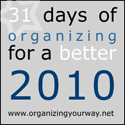31 Days of Organizing for a Better 2010: Create a Budget
Be sure you don't miss a thing! Subscribe to receive updates by email. Or if you use a feed reader, subscribe to my RSS feed! Thanks for visiting!
Join us all month for 31 Days of Organizing for a Better 2010!
When it comes to the most popular New Year’s resolutions, there’s probably a tie between those related to health and those related to finances. Obviously both of those categories have a huge impact on every area of your life, so it’s no surprise that they’re so common.
Today, we’re going to look at the first of our finance-related resolutions — creating a budget. Budgeting can be a challenge for many people because it requires time, planning and discipline, but it also provides financial freedom. With a budget, you determine ahead of time how your money will be spent rather than just spending without a plan until your money runs out and you’re forced to use debt to meet your basic needs. Even if you’re not living paycheck to paycheck, creating a budget lets you plan where your money will go so that it’s saved/invested/spent in the areas that are important to you rather than just wasted on spur of the moment purchases that you later regret.
Although I could probably spend a whole week talking about budgeting (and it’s on my list of future series), today we’re going to take a quick look at how to get started and a how to stick to your budgeting resolution.
1. Define your goals.
An important part of making a resolution to create — and stick to — a budget is knowing why it’s important to you. Are you trying to get out of debt? Do you want to stretch your budget to live more comfortably on your income? Are you focusing on building your savings or funding your retirement account? Is there another financial goal you want to work toward?
Keep these goals in mind every time you sit down with your budget so that you stay motivated and focused. Budgeting is not a fun task, especially when your income is limited and your expenses are plentiful, but keeping your eyes on the prize makes it easier to work through month after month. Today, Jessica from Life as Mom is sharing why budgeting is important and how it’s made a difference in her own life!
2. Get started.
To create a budget, you first need to track your income and expenses for at least a month. If you’re not currently tracking these things, spend January doing this, literally writing down every bit of money that you spend.
Once you have a baseline (and it’s probably something that you’ll need to adjust for the first few months since your expenses likely vary), you should categorize your expenses into groups that you’ll want to use in your budget — utilities, credit card debt, fun money, etc.
Create a list of your monthly expenses and then look at your income. If there is not enough income to cover your expenses, look for categories you can trim to bring your expenses down. If there is still income left over, add additional spending categories for savings, retirement, etc. Many financial experts request a zero-based budget, where every penny of your income is accounted for so that you know how you plan to spend it.
3. Be realistic.
I know it’s tempting to be overly optimistic when budgeting your income and expenses, but it’s better to base your budget on the minimum amount of income and the maximum amount of expenses you expect each month. Honestly, this is the hardest part of budgeting for me. Because both my husband and I have variable income, I’m almost always overly optimistic when it comes to our budget, which means we inevitably run out of money by the end of the month and have to move things around.
4. Leave wiggle room.
Likewise, create a budget line item for those unexpected expenses such as doctor’s visits, birthday parties, taking advantage of a really great deal on something you’ve been wanting and so on. It’s important to plan for these and other unexpected expenses so that your whole budget isn’t thrown into a tailspin when one crops up. Make a plan for what you’ll do with any money that isn’t spent from that line item in the current month. Will you add it to savings? Your emergency fund? Your fun money?
5. Budget fun money.
Even financial guru Dave Ramsey — who recommends approaching your debt with “gazelle-like intensity” — suggests creating a small amount of fun money as part of your budget. This scenario is probably familiar to a lot of us: you do your best to live within your means, limiting your spending to the necessities and nothing else, only to find yourself suddenly at the store splurging on something you can’t afford, which then leaves you relying on debt for the rest of your monthly expenses.
Create a fun money line item so that you can splurge on a latte or to save up for bigger purchases in order to avoid this budgeting trap. You’ll still need to develop self-discipline to keep yourself from splurging, but it will be easier to pull off mentally if you know that you do have money to spend on whatever you want.
6. Find the right system.
There are dozens, if not hundreds, of budgeting programs available. The key is to evaluate the available systems and find one that you’ll actually use. Here are a few possibilities to help you get started:
:: Pear Budget: Really Simple Budgeting, $3/month
:: Quicken Deluxe 2010: Set Goals and Save More, now only $37.99 (with instant download)
7. Get the whole family involved.
It is virtually impossible to stick to a budget if your spouse is not committed to it as well. Creating a budget should be something that you do together so that the tough decisions aren’t being made by just one of you. I would go even farther and say you should also involve your children. I don’t mean sharing every detail with them, especially if you have young children and are struggling from paycheck to paycheck. It’s important that children feel secure, and they shouldn’t be expected to shoulder the worry of where their next meal will come from. However, because we want to teach out children the importance of living within your means, these phrases are common in our house:
:: I’m sorry, that’s not in the budget.
:: We can’t afford that right now, but you can save up for it if you’d like.
:: You’ll have to save your allowance for that.
Our children are still very little, and we shield them from the worries and fears that crop up when our income is lower than we planned or we’re facing unexpected expenses, but we want them to know that money doesn’t grow on trees and that we live on a budget.
8. Don’t give up.
If you find that you’ve overspent one month or even ignored your budget completely, don’t just accept that as a sign of failure and give up altogether. Pick yourself up, remember your ultimate goal and get back on track. I know the perfectionist in you hates to see that blip in your budgeting software that proves that you’re not perfect, but you’ll never achieve your goals if you allow yourself to give up every time you fall short!
Is creating a budget one of your 2010 resolutions? What do you need to do to get started?
The 31 Days of Organizing for a Better 2010 series is sponsored by Get Organized Wizard. The Design Your Life e-program is a comprehensive self-improvement program that delivers ongoing structure, motivation and accountability for taking action.














Great post! We have been “frugal” for a while, but not yet had a written budget to guide us! Definitely part of our 2010 resolutions!
Mandy Roberson´s last blog ..New Year’s Goals and Resolutions
[Reply]
Mandi Ehman Reply:
January 2nd, 2010 at 9:01 pm
Thanks for sharing, Mandy — can’t wait to hear how you do with your budgeting resolution, but I’d say you’re more than halfway there if you’re already living frugally!
[Reply]
We’ve kept a budget on paper, using budget sheets copied from the “Money for Life Success Planner”. While this works for me, I’d like to find a really good, easy to use, online budgeting system. I need one that will easily let me personalize categories, and record daily expenditures, and then let me have a running total in each category. Does anyone have a recommendation? I tried Mvelopes and it wsan’t easy for me to use.
[Reply]
Mandi Ehman Reply:
January 2nd, 2010 at 9:02 pm
To be honest, I just use a Word document for my budget, so I’m not sure, but I think Pear Budget might be a good solution. I started setting up a budget using their system, and it seemed easy and versatile.
[Reply]
Stephanie Reply:
January 4th, 2010 at 3:06 pm
any chance you could share your word document? I’m still a paper girl and not ready for the computer budget yet! thanks so much either way!
[Reply]
We’ve recommitted to sticking to our budget this year, with a “prize” to keep us motivated. We use an inexpensive budgeting program, I *think* by a company called Snowmint. It uses an envelope system, and I love it because it’s visual, and so am I. And I absolutely agree with the “fun money” category — it’s helped me save for the stuff I really want, and pass by the stuff that’s inticing, but not really what I want.
And I absolutely agree with the “fun money” category — it’s helped me save for the stuff I really want, and pass by the stuff that’s inticing, but not really what I want. 
[Reply]
Mandi Ehman Reply:
January 2nd, 2010 at 9:03 pm
I love the idea of a prize, Suzy! Rewarding yourself for sticking with a goal is a great way to stay motivated!
[Reply]
I think a written or electronic budget is absolutely necessary to get control of your money. Personally, I use YNAB for Windows to manage my budget. It is awesome because it is based on four solid finanical principles that fit very nicely with what you’ve listed above.
I especially like points #4 and #5 above. A rigid budget will die a quick death. You’ve got to keep it flexible. A budget is supposed to be a map not a club.
[email protected]´s last blog ..Simplicity in Life: 10 Free Resources To Achieve It
[Reply]
Mandi Ehman Reply:
January 2nd, 2010 at 9:06 pm
I hadn’t heard of YNAB before, Jeff, but it looks interesting! I love that it’s colorful with graphics to help you evaluate your spending. Thanks so much for sharing!
[Reply]
I found that by allowing the Man Beast to take a set amount of money out of each paycheck for his ‘mad money’, he is more on board with me and the budgeting.
Iva @ HorizontalYoYo´s last blog ..Starting the New Year of Right: Live More
[Reply]
Mandi Ehman Reply:
January 2nd, 2010 at 9:04 pm
This is a great point, Iva — it really is key for bringing a “spender” on board with a stricter budget!
[Reply]
Thank you. I will check out those budgeting tools. We each give ourselves a cash allowance that we’re not accountable to anyone for; and then we also have some “dining out” money.
[Reply]
Mandi Ehman Reply:
January 12th, 2010 at 9:39 pm
I think that’s so important, Janee! We try to set money aside for eating out as well because it’s something we love to do!
[Reply]
[...] 31 Days of Organizing for a Better 2010: Create a Budget [...]
[...] 31 Days of Organizing for a Better 2010: Create a Budget [...]